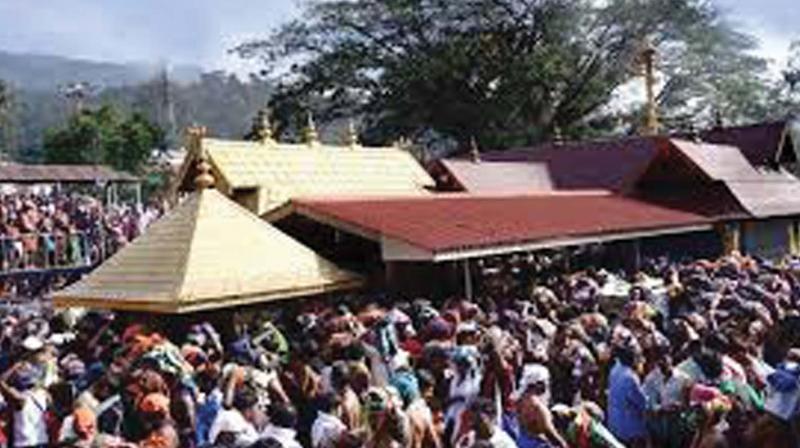Bar on women at Sabarimala inconceivable, says Kerala government
Therefore it is inconceivable to argue that women below 50 years cannot enter the temple, senior counsel for Kerala,

New Delhi: The Kerala government has maintained in the Supreme Court that from 1950 till 2007 there was no bar under the Travancore-Cochin Hindu Religious Institutions Act for a woman of 35 years to become a member of the Travancore Devaswom Board.
Therefore it is inconceivable to argue that women below 50 years cannot enter the temple, senior counsel for Kerala, Vijay Hansaria said in his written submission to the Supreme Court on Thursday.
He said the 1950 Act nowhere debars women being a member of the Board and it prescribed minimum age of 35 as the qualification till 2007. Thus, under the Act, as enacted initially, women of 35 years could be a member, and this position continued from 1950 till 2007 amendment increasing the age to 60.
He submitted that when under the statute, the members of the Board, who regulate the entire activity of the temple could be a woman of 35 years of age; it is inconceivable to argue that women of that age group cannot enter the temple.
He said the devotees of Sabarimala temple do not constitute ‘religious denomination’ within the meaning of Article 26 of the Constitution, and the exclusionary practice is not an essential religious practice.
Further, the protection under Article 26 to manage religious affairs is available only to “every religious denomination or section thereof” and not to devotees of a particular temple or deity. In the present case, Sabarimala is a temple of Lord Ayyappa, and the devotees are Ayyappans; however, it is an admitted position that there are over 1000 other Ayyappa temples in the country in which all worship the deity without any exception to women of any particular age group. He pointed out that the review petitioners claimed right under Article 26 of the Constitution, not by religious denomination and not even as followers of a particular deity but based on so-called practice in a particular one temple at Sabarimala out of more than 1000 temples of Lord Ayyappa. This court has consistently held that it is only ‘religious denomination’ which must fulfil the following three criteria are entitled to be recognised as religious denomination and claim right under Article 26 of the Constitution, viz a common faith; a common organisation and designation of a distinctive name.
In the present case none of the three ingredients can be claimed by the devotees of Sabarimala Temple, and as such right under Article 26 cannot be claimed to justify the exclusionary practice in the said temple. It is an admitted position that the restriction on entry of women was only during Mandalam, Makaravilakku and Vishnu days; and on other days when the temple is open, women worshippers of all age group are allowed. The admitted position clearly negates the contention that Lord Ayyappa who is a Naishtika Brahmacharya does not want to see a female between 10 to 50 years of age as it may affect the celibacy and austerity observed by the deity.
Further, the contention that Lord Ayyappa being Naishtika Brahmacharya and their presence would deviate the deity from the celibacy is against the basic human dignity of a woman.
The mere presence of a woman of a particular age group cannot be assumed that the celibacy of the deity would be affected and the said argument derogates the dignity of a woman and recognises even a child of ten years can be a source of deviation from celibacy of the deity. The counsel said that attaching impurity to a woman during the menstrual period is an abrasion to entire humanity and abhorrent to civilised society as menstruation is a natural process and is essential for procreation.
Since women without menstruation there can be no human beings; hence, the argument for exclusion of women during menstruation period on the ground of impurity is the worst kind of exclusionary practice and is an anathema to humanity itself apart from being stigmatic and oppressive.

